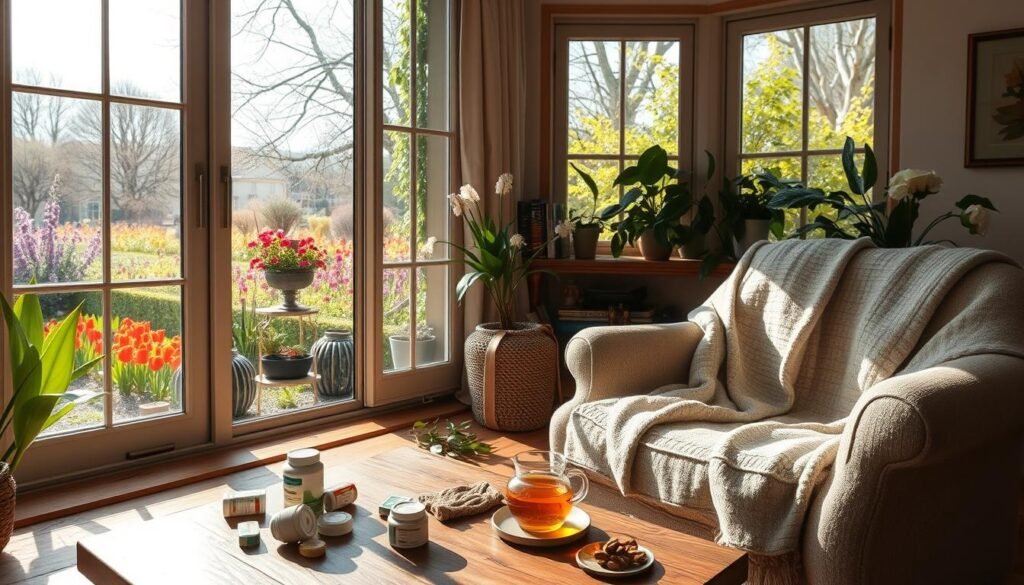Almost 50 million people in the U.S. deal with allergies every year. This often leads to feeling very tired during allergy seasons. The arrival of spring might mean pretty flowers, but it also means more pollen, dust, and mold in the air. These can cause people to feel extra tired because of their allergies. It’s important to know how allergies and tiredness are linked. This can help you keep your energy up. In this article, we’ll talk about why allergies make you tired. We’ll also share ways to avoid allergens and tips for taking care of yourself. These tips can help you beat tiredness linked to allergies.
Key Takeaways
- Spring brings an increase in allergens like pollen and mold, contributing to fatigue.
- Fatigue levels can vary widely among individuals, affecting their daily activities.
- Coughing and sneezing disrupt sleep patterns, leading to daytime tiredness.
- Allergy tests are crucial for identifying specific allergens and creating treatment plans.
- Effective stress management techniques can alleviate allergy-related fatigue.
- Staying hydrated is essential for managing allergy symptoms and boosting energy levels.
Understanding Allergy Fatigue
Allergy fatigue is a deep tiredness caused by your body fighting allergens. Understanding what causes allergy fatigue is key to handling its impact. Your immune system sees things like pollen, dust, and mold as dangers. This starts a chain of reactions.
What Causes Allergy Fatigue?
When you come into contact with allergens, your body releases histamines. This action, meant to protect you, can cause inflammation and symptoms like sneezing and stuffy nose. These reactions often lead to feeling very tired. They can also mess with your sleep, making you even more weary during the day.
The Role of Histamines and Immune Response
Knowing about histamines helps us get why allergy fatigue happens. They are released by your immune system to fight off allergens. This can make you feel as if you’re sick, making you very tired. Fighting allergies hard can tire out your body. You might get a runny nose, itchy eyes, and have trouble sleeping, all adding to the fatigue.
It’s vital to know which allergens affect you to manage symptoms better. Allergy tests can help find out what’s triggering your symptoms. Learning about what can help and setting the right expectations is important. For personalized tips on dealing with allergy fatigue, check out Penn Medicine Becker ENT & Allergy.
Common Allergic Rhinitis Symptoms and Fatigue
Allergic rhinitis shows through many symptoms. These can greatly affect someone’s life. Sneezing, itchy eyes, and a stuffed nose are common.
Yet, fatigue is also a key symptom to notice. Knowing how these symptoms link with bodily and mental health is crucial. This knowledge helps in managing them well.
Physical Symptoms of Allergies
Physical Symptoms of Allergies include nasal blockage, runny noses, and breathing problems. These issues can mess with sleep, making you feel tired all day.
Pollen levels can make this worse on hot, windy days. Allergy symptoms may increase with the change of seasons. This is true in early spring, late spring, summer, and fall.
Mental Health Impact: Brain Fog and Concentration
Allergic reactions can cause fatigue. This, in turn, leads to brain fog. Brain fog affects focus and makes daily tasks hard.
This mix of physical and mental fatigue reduces life quality. Talking with a doctor about treatments can help. Allergy tests can also find what triggers your symptoms. For more information, click here.
Identifying Seasonal Allergy Fatigue Triggers
Understanding the triggers of seasonal allergy fatigue is important. It helps people manage their symptoms better. By knowing what makes allergies worse, people can avoid these things.
How Environmental Factors Contribute
Environmental factors play a big role in allergy fatigue. Pollens from trees, grasses, and weeds can make people very tired. This is especially true during certain times of the year.
Tree pollen is most common in early spring. Grass pollen affects people from late spring through summer. In the fall, ragweed pollen causes a lot of allergy problems. Other things that impact allergies include:
- Weather changes can make pollen levels go up quickly. This can increase allergy fatigue.
- Poor air quality worsens allergies. This leads to more symptoms and tiredness.
- Indoor allergens like dust mites and mold are always around. They keep people feeling tired.
Allergens to Look Out For
It’s important to know which allergens cause the most trouble. Here are some common ones:
- Pollen: Comes from trees, grasses, and weeds. Knowing the local pollen count helps avoid it.
- Dust mites: Live in soft fabrics. They are a problem all year.
- Mold spores: Found inside and outside. They are worse in humid weather.
- Pet dander: Animal fur can make allergies worse, especially indoors in the cold months.
| Allergen | Peak Season | Symptoms |
|---|---|---|
| Tree Pollen | Early Spring | Nasal congestion, sneezing, fatigue |
| Grass Pollen | Late Spring to Summer | Itchy eyes, coughing, headaches |
| Ragweed Pollen | Fall | Nasal irritation, extreme tiredness |
| Dust Mites | Year-Round | Rashes, fatigue, sneezing |
| Mold Spores | Humid Weather | Breathing difficulties, sinus headaches |
Managing Fatigue During Allergy Season
Handling fatigue in allergy season means being active ahead of time. Using smart avoidance tactics can cut down symptoms and boost health. It’s all about making a plan that avoids allergens, with easy lifestyle changes.
Effective Avoidance Strategies
Keeping living areas clean is a top way to dodge allergens. Dust, pet fur, and pollen build up fast, making things worse. Air purifiers can clean the air, easing congestion and other issues. Staying inside when pollen is everywhere helps a lot too.
Putting on a mask for outdoor chores offers extra safety. This way, you can garden or do yard work with less worry.
Importance of Allergy Testing
Understanding how critical allergy testing is can change how you deal with allergy fatigue. Tests like skin pricks or blood tests pinpoint your specific allergens. Knowing what bothers you helps you stay away from those triggers, key to dodging fatigue from constant irritant exposure.
Getting advice from experts at places like Carolina Ear Nose & Throat – Sinus and Allergy Center is vital. They may suggest immunotherapy. This method slowly gets your body used to allergens, increasing your tolerance over time.

Combatting Hay Fever Fatigue with Lifestyle Changes
Fighting hay fever fatigue needs changes in how we live. Making small tweaks can reduce symptoms and bring back energy during allergy season.
Incorporating Regular Exercise
Exercise is key to feeling better and works well against hay fever fatigue. It perks up energy, betters sleep, and cuts down on stress. Try to be active when pollen isn’t as much in the air to avoid allergy flare-ups.
Mornings might be best for a workout because pollen increases later. If outside isn’t good, consider indoor activities like yoga or stationary biking. Even hiking can boost your mood by connecting you with nature.
Stress Management Techniques
Handling stress well is vital when fighting hay fever fatigue. Too much stress can make allergy symptoms worse, resulting in tiredness. Use yoga, meditation, or breathing exercises to relax and clear your mind.
Add mindfulness to your day to keep calm and lessen allergy stress. Taking part in stress management sessions helps find ways to cope. Keeping your space tidy can also lower stress and make dealing with allergies easier.
Boosting Energy Levels with Allergies
When you have allergies, you often feel tired. Taking the right approach to Diet and Nutrition can really help. Eating foods full of antioxidants, like fruits and veggies, helps fight inflammation. They also give you important nutrients that boost your immune system. Adding proteins and complex carbs to your diet gives you energy all day.
Diet and Nutrition for Energy Maintenance
Eating the right foods is key to Boosting Energy Levels with Allergies. Whole grains, lean proteins, and healthy fats are good choices. Here is a table showing some great food options that can lift your energy:
| Food | Benefits |
|---|---|
| Spinach | High in iron, improves energy levels and combats fatigue. |
| Salmon | Rich in omega-3 fatty acids, helps reduce inflammation. |
| Oatmeal | Provides long-lasting energy due to its complex carbohydrates. |
| Almonds | High in magnesium, supports muscle function and reduces fatigue. |
| Berries | Full of antioxidants, helps combat oxidative stress. |
Hydration is also super important in fighting fatigue. It helps with allergy symptoms and keeps your energy up. Drinking lots of water makes your mucus thinner, which makes it easier to breathe. It also cuts down on tiredness. Try to drink at least eight glasses of water every day to stay healthy and fight off fatigue from allergies.
Hydration’s Role in Combating Fatigue
If you have allergies, make sure you drink enough water. It helps get rid of allergens in your body. Not drinking enough can make you even more tired. Staying hydrated improves your physical and mental performance. For more tips on how allergies affect energy levels, check out this resource.

Natural Remedies for Allergy Fatigue
Looking for natural remedies for allergy fatigue can boost well-being during allergy season. Many people want relief from ongoing symptoms without always using prescription medicines. Trying different herbal supplements and homeopathic remedies can help improve health.
Herbal Supplements and Treatments
Herbal supplements are a natural way to fight allergy fatigue. Butterbur is recognized for its effectiveness, much like antihistamines. A review in 2003 showed butterbur helps with itchy eyes. Also, quercetin helps control allergy symptoms by stabilizing histamine release. Taking 2,000 milligrams of vitamin C daily can lower histamine.
Other good herbal treatments include:
- Spirulina, which helps against allergic rhinitis.
- Stinging nettle, a natural antihistamine.
- Peppermint oil, with its anti-inflammatory qualities for asthma and allergic rhinitis.
Homeopathic Approaches to Relief
Homeopathic treatments for allergy fatigue are tailored to each person. Acupuncture has shown benefits for seasonal and year-round allergies in a 2015 review. Saline nasal irrigation also helps adults and kids with allergic rhinitis, a 2012 study found.
Some believe local honey might reduce allergies, though it’s more folklore than science. Essential oils like eucalyptus are favored for their natural healing powers. Eucalyptus oil in laundry can fight allergens and add antimicrobial benefits.
Looking into natural remedies for allergy fatigue can be worthwhile. Combining herbal supplements with homeopathic methods could provide needed support. Always check with healthcare experts before trying new treatments to ensure they are safe and right for you. For more information, visit this link.
| Natural Remedy | Type | Potential Benefits |
|---|---|---|
| Butterbur | Herbal Supplement | Relieves itchy eyes and allergy symptoms |
| Quercetin | Natural Compound | Stabilizes histamine release |
| Vitamin C | Vitamin | Reduces histamine levels |
| Acupuncture | Homeopathic Approach | Improves nasal symptoms |
| Saline Nasal Irrigation | Homeopathic Approach | Beneficial for allergic rhinitis |
Allergy Season Self-Care Tips
When allergy season rolls in, taking care of yourself is key. You should get enough sleep and avoid allergens. These steps will help manage symptoms and boost your well-being.
Establishing a Restful Sleep Routine
Good sleep is crucial for battling allergy symptoms. It fights the tiredness allergens cause. Here are some tips to sleep better:
- Go to bed and wake up at the same time each day to regulate your internal clock.
- Practice relaxation techniques such as meditation or gentle stretching before bedtime.
- Limit screen time at least an hour before sleeping to promote better rest.
- Use hypoallergenic pillows and mattress covers to prevent dust mite exposure.
To sleep peacefully, you must reduce allergens around you. Following these recommendations will help.
Creating an Allergen-Free Environment
It’s vital to make your surroundings allergen-free. Here are some strategies to keep your place clean and cozy:
- Keep windows closed during high pollen counts, usually in the morning and early evening.
- Use HEPA filters in air purifiers and replace air filters in HVAC systems regularly.
- Regularly vacuum carpets, wash bedding, and dust surfaces to minimize dust and pet dander.
- Consider *pet-free* zones in the home to limit exposure to allergens.
Keep an eye on pollen levels with daily forecasts. Stay inside when pollen is high. This can help lower your symptoms. If you need more help, see an allergy specialist.

Over-the-Counter and Prescription Medications
Dealing with seasonal allergies means picking the right meds. Over-the-counter meds are easy to get and work well for most. Some need prescription meds for ongoing issues.
Choosing the Right Antihistamines
Knowing how antihistamines work helps in choosing them. They stop histamine, which causes sneezing, itching, and stuffiness. Options like Loratadine (Claritin), Cetirizine (Zyrtec), and others are popular. They’re available in different forms. It’s key to pick Choosing Antihistamines that won’t make you sleepy if you need to stay awake.
Exploring Immunotherapy Options
Immunotherapy is a good long-term choice for tough allergies. It slowly makes you less sensitive to allergens. This can mean less need for Over-the-Counter Medications. Always talk to a doctor to see if it’s right for you or your kids.
| Medication Type | Examples | Form | Primary Use |
|---|---|---|---|
| Antihistamines | Loratadine, Cetirizine | Tablets, Liquid | Relief of sneezing, itching, and runny nose |
| Nasal Corticosteroids | Fluticasone, Budesonide | Nasal Spray | Control inflammation and nasal symptoms |
| Decongestants | Pseudoephedrine, Phenylephrine | Tablets, Liquid | Relief from nasal congestion |
| Immunotherapy | Allergy Shots, Sublingual Tablets | Injection, Tablet | Long-term tolerance to allergens |
Conclusion
Managing tiredness in allergy season requires a plan that focuses on knowing why you feel tired and using effective methods. Around 60 million Americans suffer from allergic rhinitis, and many also have asthma. It’s important to deal with both conditions to feel better. Changing your lifestyle, eating better, and choosing the right medicines can help reduce symptoms and fight off tiredness.
This article highlights how crucial it is to know what triggers your allergies and to take care of yourself. Getting enough sleep and keeping your surroundings allergen-free are key steps. These actions are vital in overcoming tiredness during allergy season. They help individuals feel more energetic and live better.
Understanding how allergies affect your daily life and emotions is the first step to taking control. By being careful and making smart choices, you can face allergy season’s challenges. This way, you can reduce tiredness and keep feeling active and healthy.